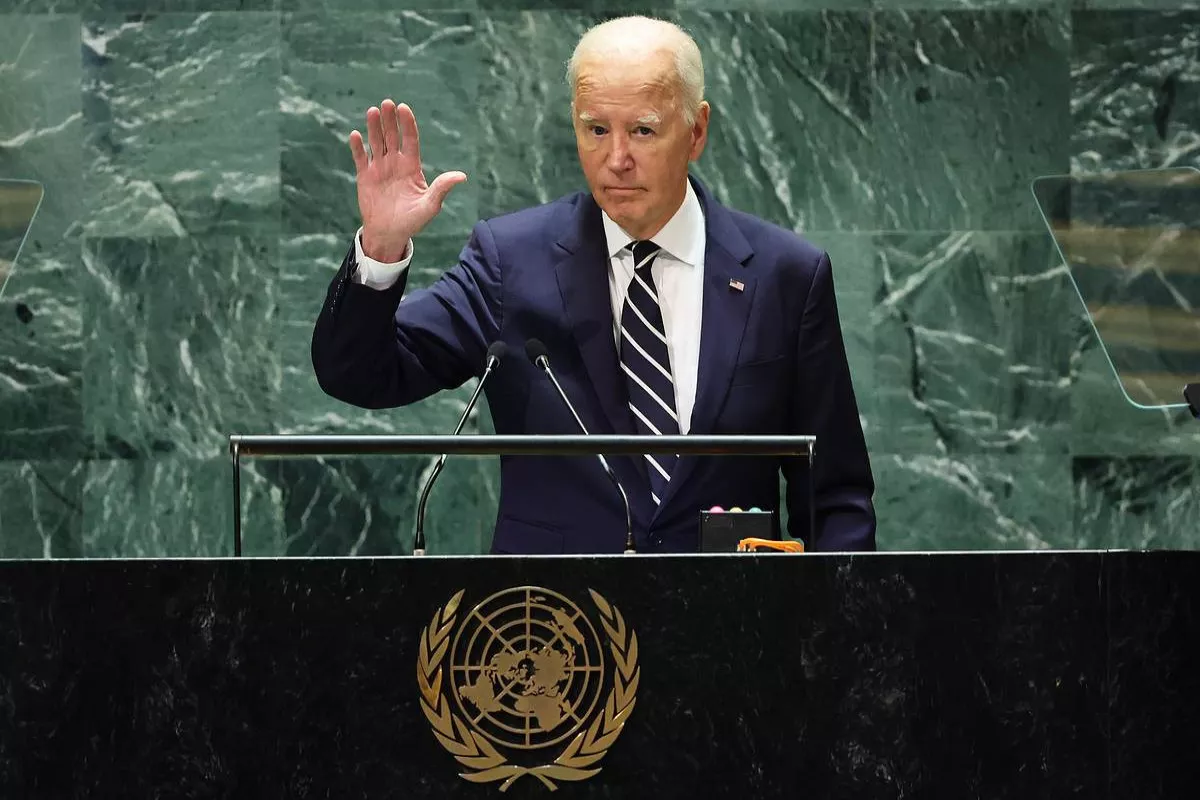Biden’s inflection point The Irony of global Unity
Lately, we’ve been hearing less from Joseph Biden himself and seeing less media coverage about him, even though he remains the President of the United States. Whether he’s merely a figurehead is beside the point. What’s more striking is how Kamala Harris has drawn attention away from the White House’s current occupant, to the extent that even Biden’s gaffes are largely ignored by the media.
At this point, readers may wonder why we’re focusing on specific elements of Biden’s speech at the 79th session of the UN General Assembly. The answer is simple: While the speech was likely not penned by Biden himself, it reflects Washington’s position on the most critical global issues. For this reason, certain details from his address are worth examining for their impact on global geopolitics.

First and foremost, Biden described the current phase of human history as “another inflection point in world history where the choices we make today will determine our future for decades to come.” By “our,” Biden clearly referred to the closest US allies. The rest of humanity, which may have its own perspective on the world, went unmentioned by Biden. Nevertheless, among the significant issues outlined by the US president, attention can also be drawn to his emphasis on the threats to “democracy and strains within our societies.” This immediately raises the question: What do Biden’s speechwriters mean by “democracy” in general? Openly supporting Armenian separatism, where in violation of all norms of international law, criminals receive official invitations to participate in various forums held by the US Congress and State Department? Or calls for anti-Georgian sanctions over the Georgian parliament’s decision to protect national interests (on September 25, Washington removed Georgian Prime Minister Irakli Kobakhidze from the guest list for the annual reception of the UN Association)?
On the other hand, is Biden and his team really unaware of the causes of the “tensions within societies” that he so loudly proclaimed? After all, Biden's speechwriters themselves referenced the following lines from 19th-century Irish poet William Butler Yeats:
Things fall apart; the centre cannot hold,
Mere anarchy is loosed upon the world.
Of course, the perspective on global "anarchy" in these lines is quite intriguing. But one might ask, who does the White House consider the “rulers of the world”? Or perhaps, does Washington refer to the strengthening positions of new states in different parts of the world as "anarchy" on a global scale? Interestingly, Biden remarked that while many would interpret this quote in the context of today's era, he sees a “critical distinction,” as “in our time, the center has held. Leaders and people from every region and across the political spectrum have stood together.”
It’s curious whether those who wrote Biden’s speech truly believe that the “cohesion” of the world has been preserved and that the entire global population unequivocally supports the forces the current occupant of the Oval Office speaks of. But never mind, we’ll leave it to serious analysts to make sense of Biden’s theoretical, philosophical, and social arguments. As for us, let’s try to grasp which global issues Washington considers “inflection point.”

Overall, there’s nothing surprising about the speechwriters’ emphasis on supporting Ukraine until a “just and durable peace [based] on the U.N. Charter” is achieved. Nor is it unexpected that Biden stressed the need to “uphold our principles as we seek to responsibly manage the competition with China.” The speech outlines the intent to “unfair economic competition and against military coercion of other nations in — in the South China Sea” while emphasizing “to strengthen our network of alliances and partnerships across the Indo-Pacific” and relying on “new partnerships like the Quad with the United States, Japan, Australia, and India.” This immediately raises the question: How does Biden’s claim of “global cohesion” hold up if he is essentially promoting a bloc-based approach to international relations?
Naturally, Biden also touched on the Middle East. Expressing his sorrow alongside the families of hostages, the president spoke about the “immense suffering of innocent civilians of Gaza.” He followed this with broad statements about his commitment to preventing a broader war and “the rise of violence against innocent Palestinians on the West Bank,” with the aim of creating conditions for a “two-state solution,” as this is the only path “to deal with the ongoing threat posed by Iran.” In reality, this rhetoric has been repeated since October 7. Meanwhile, U.S. aircraft carriers are being deployed to the region, and the prospect of a regional war, with the potential to escalate into a global conflict, looms ever closer.
The head of the Washington administration also didn’t miss the opportunity to touch on topics such as the reform of the UN Security Council, the challenges posed by the development of artificial intelligence (which “in the years ahead, may well be no greater test of our leadership than how we deal with AI.”), and the difficulties faced by LGBT activists in Uganda.
Thus, even a cursory glance at the text of the speech delivered by Biden at the 79th session of the UN General Assembly reveals that the United States continues to pursue a bloc-based approach to international relations, unwilling to accept the rising significance of countries like China or various other regions (or global organizations). Consequently, it can be said that Washington still does not intend to reconcile itself with the realities established in Asia, Africa, the South Caucasus, or Central Asia.
In this light, I would like to conclude this piece without further commentary, with a quote from the same William Butler Yeats that Biden referenced:
"That civilisation may not sink,
Its great battle lost,
Quiet the dog, tether the pony
To a distant post."








